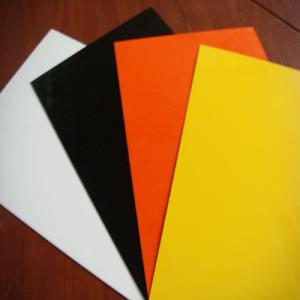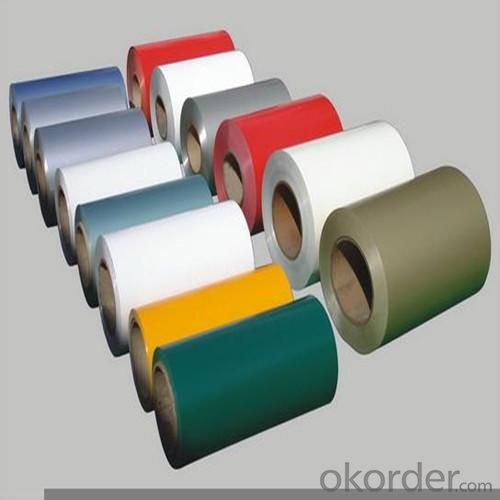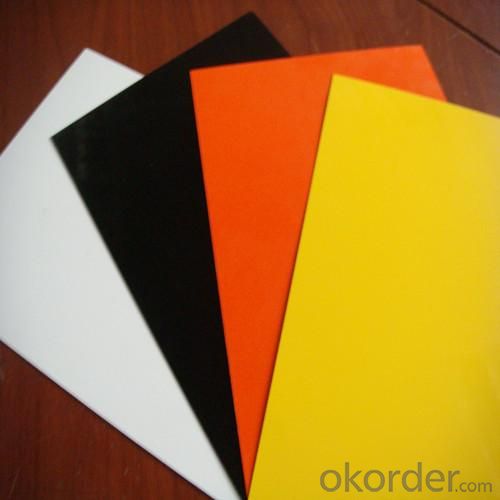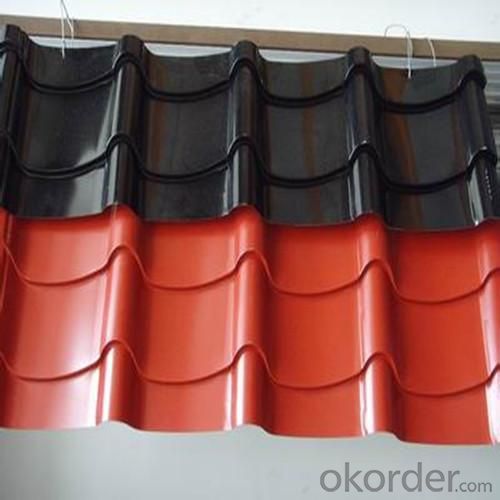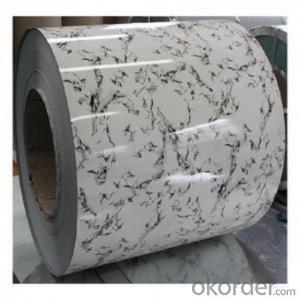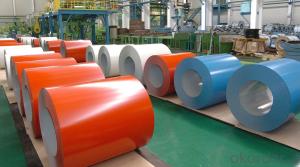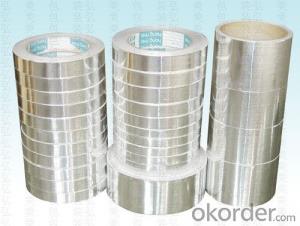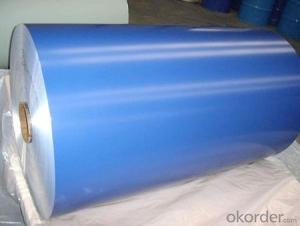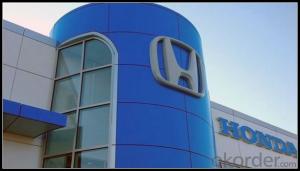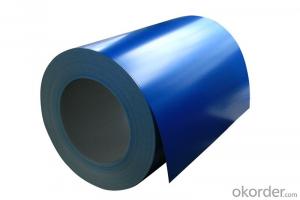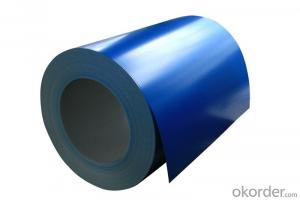PE Coated Aluminium Coil 0.25mm,0.30mm,0.40mm,0.50mm
- Loading Port:
- China main port
- Payment Terms:
- TT or L/C
- Min Order Qty:
- 3 m.t.
- Supply Capability:
- 8000 m.t./month
OKorder Service Pledge
OKorder Financial Service
You Might Also Like
1 Specifications of PE Coated Aluminum Coil/Sheet
Alloy | AA1050,AA1060, AA1070, AA1100, AA3003, AA3004, AA3005, AA3105, AA5005, AA5052, AA5754, AA5083, AA8011 |
Temper: | H12, H14, H16, H18, H22, H24, H26, H32,HO, F |
Thickness: | 0.10-4.0mm |
Width: | 10mm- 2000mm |
Coating | PE(Polyester) |
Painting Thickness | Standard 16-25 microns, max 40 microns |
Color | Acording to Ral colors or customer’s samples |
Standard: | GB/T17748-1999, ASTM, ISO, EU standard |
Special Specification is available on customer’s requirement | |
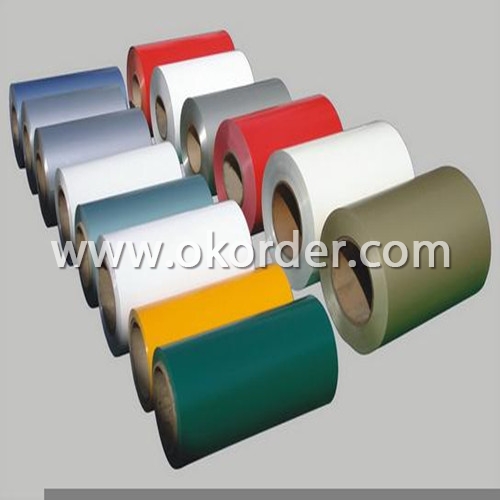
PE(polyester) Coating
PE(polyester) coating:high molecular polymer as monomer and addition of alkyd, is an UV-resistant coating. It can be classified matt and glossy according to coating gloss. The compact molecule structure, makes paint surface luster and smooth,which assure good printing on the panel surface. With an warranty of 8-10 years for weather resistance, it is specially applied for internal decoration and sign board.
2 Usage/Applications of PE Coated Aluminum Coil/Sheet
Our company's PE Coated Aluminum Coil/Sheet have been widely used in the fields of construction and decoration(garage doors, ceiling etc.), electronic appliances, lighting decoration, air-condition air pipe, sanwich panels and drainage, etc.
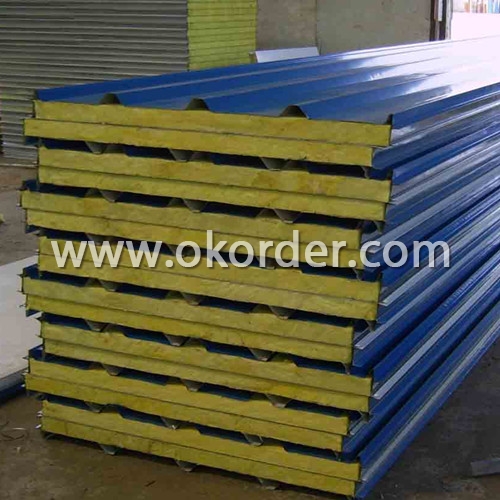
3 Packaging & Delivery of PE Coated Aluminum Coil/Sheet
Packaging: Seaworthy package, plastic bag covered inside, carton wrapped outside, paper core, on the wooden pallet. Pallet weight: 2000-25000KG.
Shipment: the goods will be delivered in 40 days after getting the buyer's payment.
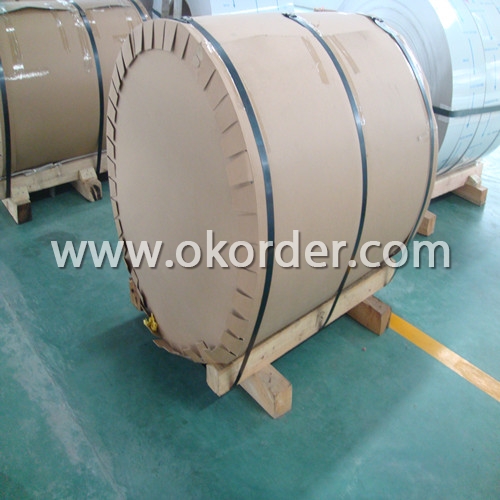
4 Production Flow of PE Coated Aluminum Coil/Sheet
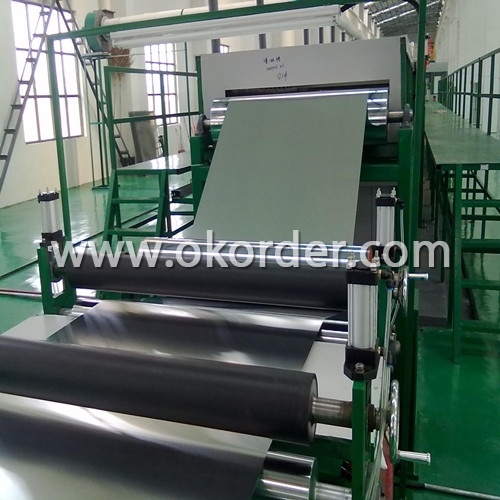
PVDF coated aluminum coil
| Aluminum Alloy | AA1100; AA3003; AA5005 |
| Coil thickness | 0.25mm,0.30mm,0.40mm,0.50mm |
| Coil width | 1240mm, 1270mm, 1520mm, 1550mm, 1575mm |
| Coating thickness | Over 25 micro |
| Diameter | 405mm, 505mm |
| Coil weight | 2.5 to 3.0 tons per coil |
| Color | White series, metallic series, Dark series, Gold series( accept color customs) |
Polyester coated aluminum coil
| Aluminum Alloy | AA1100; AA3003; AA5005 |
| Coil thickness | 0.18mm,0.21mm,0.25mm,0.30mm,0.40mm,0.45mm,0.50mm |
| Coil width | 1240mm, 1270mm, 1520mm, |
| Coating thickness | Over 16 micro |
| Diameter | 405mm, 505mm |
| Coil weight | 2.5 to 3.0 tons per coil |
| Color | White series, metallic series, Dark series, Gold series( accept color customs) |
Brush finish aluminum coil
| Aluminum Alloy | AA1100; AA3003 |
| Coil thickness | 0.15mm, 0.21mm, 0.30mm, 0.40mm, 0.50mm |
| Coil width | 1240mm, 1270mm, 1520mm, |
| Diameter | 405mm, 505mm |
| Coil weight | 2.5 to 3.0 tons per coil |
| Color | Silver & gold |
- Q: What is the balanced equation for copper (I) oxide and Aluminum?
- Copper(I) oxide is a solid and so is aluminum. Any reaction that might occur would have to be at an elevated temperature. This is a thermite reaction in which copper(I) is reduced to copper metal (molten) and aluminum is oxidized to aluminum oxide. 3Cu2O(s) + 2Al(s) -- 6Cu(s) + Al2O3(s) ========= Follow up ========== Do you mean in aqueous solution? There won't be any copper(I) chloride in aqueous solution. CuCl is very insoluble in water, but will undergo disproportionation to form Cu2+ ions and copper metal. Therefore, you would actually have a solution of copper(II) chloride. Copper(II) chloride will react with aluminum to form copper metal and aluminum ions. Ordinarily aluminum won't react with copper(II) ions. The reaction does proceed in the presence of chloride ion. This is because the chloride ion will react with the Al2O3 layer on the surface of aluminum metal to make [AlCl4]^- which exposes the aluminum metal below, and thus a reaction can occur. 3Cu2+ + 2Al(s) -- 2Al3+ + 3Cu(s)
- Q: I was told today that taking aluminium inside your body greatly increases the chance of getting alzheimers as they destroy cells. Is this true?If so, then what foods contain aluminium?Thanks in advance :)
- complex aspect. research using the search engines. it can assist!
- Q: I'm doing a project on aluminum and this is the one thing i can't find. Also will it rust, tarnish or corrode?
- Aluminum is not explosive, although in the presence of a suitable oxidizing agent it can burn. It does not rust (that concept applies only to ferrous metals), but can corrode and will tarnish rapidly if a cut surface is exposed to air. The tarnish, aluminum oxide, protects the surface from further oxidation, and a process called anodizing puts a heavy oxide layer on the surface for improved protection. Aluminum is produced by electrolysis from aluminum oxide, which is dissolved in molten aluminum fluoride; a typical electrolytic pot uses a current of 5 volts at 105,000 amperes and will produce a ton of aluminum per day.
- Q: I read the back of my deodorant and it said that it contains 14% Aluminum. Is that harmful for my baby?
- If there was solid proof and research that showed it was bad for you or baby while pregnant your doctor would have told you not to use it. It's a matter of debate and controversy still and has been for many years, and I'm sure it will continue to be for many years. If you are worried, you can by aluminum free anti-perspirants, I believe Tom's of Maine makes one that is very effective. Or you can use one that just contains less.
- Q: I live around Minneapolis, MN. Is there a place that you can recycle crushed aluminum cans for money around here?
- Go to the Earth911 website. Enter in your zip code and it will give you a list of recyclers closest to you. Minnesota does not have a can bottle deposit so the money you get will be for the scrap metal.
- Q: What house hold materials contain 100% pure aluminum. or where can i buy it. im making thermite, which ive made before so don't say, its dangerous don't do it, but do i need 100% pure aluminum or will some aluminum alloy with like 90% aluminum work?????
- Aluminum foil is your best bet. According the the Reynold's wrap web site, their foil is 98.5% aluminum.
- Q: Can aluminum coils be used in packaging industries?
- Indeed, the packaging industry can utilize aluminum coils. Aluminum emerges as a favored option for packaging materials owing to its abundant advantageous properties. It possesses a lightweight nature, durability, resistance to corrosion, and exceptional thermal conductivity. Such attributes render aluminum coils appropriate for a variety of packaging applications encompassing food and beverage packaging, pharmaceutical packaging, and cosmetic packaging. Moreover, aluminum stands out as highly recyclable, thereby constituting an environmentally conscious choice for the packaging industry. All in all, aluminum coils deliver remarkable performance and versatility, rendering them a fitting choice for packaging industries.
- Q: How are aluminum coils used in the production of food processing equipment?
- Aluminum coils are widely used in the production of food processing equipment due to their desirable characteristics and benefits. These coils are typically made from high-quality aluminum alloy, which offers excellent heat conductivity, corrosion resistance, and durability. One primary application of aluminum coils in the food processing industry is in the construction of heat exchangers. These heat exchangers are essential components of various food processing equipment, such as ovens, fryers, and refrigeration systems. The aluminum coils within the heat exchangers facilitate the transfer of heat between different mediums, ensuring efficient and precise temperature control during food processing. Another important use of aluminum coils is in the manufacturing of evaporator coils. These coils are integral to refrigeration systems used in commercial food processing. The evaporator coils, made from aluminum, aid in the cooling process by absorbing heat from the surrounding environment and allowing refrigerants to evaporate, thereby maintaining low temperatures within the equipment. Additionally, aluminum coils find application in the construction of food storage and transportation equipment, such as refrigerated trucks and containers. Aluminum's lightweight nature contributes to fuel efficiency and enables easier transportation of food products while maintaining their quality and freshness. Furthermore, aluminum coils are valued for their hygienic properties and ease of cleaning, making them ideal for food processing equipment. Aluminum surfaces can be easily sanitized, ensuring a high level of cleanliness and preventing contamination during food production. Overall, aluminum coils play a crucial role in the production of food processing equipment by providing excellent heat transfer, corrosion resistance, durability, and hygienic qualities. Their usage helps ensure efficient food processing operations, optimal temperature control, and the maintenance of food quality and safety standards.
- Q: Is it possible to utilize aluminum coils in the packaging of food products?
- <p>Yes, aluminum coils can be used for food packaging. They are commonly used in the production of aluminum foil, which is a popular material for food packaging due to its properties such as light weight, barrier to light and oxygen, and recyclability. Aluminum foil is used to wrap food, line baking sheets, and create containers, providing a protective barrier that helps to preserve freshness and extend shelf life. However, it's important to ensure that the aluminum used meets food-grade standards to avoid any health risks.</p>
- Q: Are aluminum coils prone to corrosion?
- Aluminum coils have a tendency to corrode, as aluminum is a reactive metal that readily develops a protective oxide layer upon contact with oxygen. Nevertheless, certain environmental elements like moisture, salt, or corrosive substances can compromise this oxide layer. Consequently, corrosion may gradually manifest on the surface of aluminum coils. To mitigate this risk, regular maintenance and appropriate care, such as cleaning and applying protective coatings, can be beneficial.
1. Manufacturer Overview
| Location | Henan,China |
| Year Established | 2002 |
| Annual Output Value | Above US$200 Million |
| Main Markets | Mid East;Eastern Europe;North America |
| Company Certifications | ISO 9001:2000;ISO 14001:2004;OHSAS 18001 |
2. Manufacturer Certificates
| a) Certification Name | |
| Range | |
| Reference | |
| Validity Period |
3. Manufacturer Capability
| a) Trade Capacity | |
| Nearest Port | Shanghai |
| Export Percentage | 30%-50% |
| No.of Employees in Trade Department | 21-50 People |
| Language Spoken: | English;Chinese |
| b) Factory Information | |
| Factory Size: | Above 100,000 square meters |
| No. of Production Lines | Above 10 |
| Contract Manufacturing | OEM Service Offered;Design Service Offered |
| Product Price Range | Average |
Send your message to us
PE Coated Aluminium Coil 0.25mm,0.30mm,0.40mm,0.50mm
- Loading Port:
- China main port
- Payment Terms:
- TT or L/C
- Min Order Qty:
- 3 m.t.
- Supply Capability:
- 8000 m.t./month
OKorder Service Pledge
OKorder Financial Service
Similar products
Hot products
Hot Searches
Related keywords

